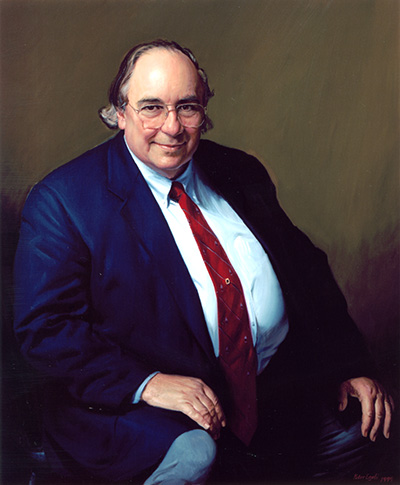Donald Straley Coffey

Donald Straley Coffey
- Artist:
- Peter E. Egeli
- Date:
- 1999
- Medium:
- Oil on canvas
- Dimensions:
- 40 x 34 in.
Donald Straley Coffey
1932-2017
Coffey, a professor of urology, oncology, pathology, and pharmacology and molecular sciences at the Johns Hopkins University School of Medicine, was born in Bristol, Tennessee. He received his bachelor’s degree from the East Tennessee State University in 1957. After working as a chemist for the North American Rayon Co. in Elizabethton, Tennessee during his last two years of college, Coffey took a job as an associate chemical engineer at the Westinghouse Electronic Corporation in Baltimore after graduation.
Coffey’s dream was to do cancer research. While his academic credits at the time were not sufficient for admission to graduate school, he was able to attend evening classes at Johns Hopkins’ McCoy College. While there, he was hired to work nights at the Brady Urological Research Laboratory. Coffey became acting director of the lab for the year 1959-1960. With encouragement, Coffey applied for the graduate program in the Johns Hopkins University School of Medicine department of physiological chemistry, where he earned his Ph.D. in 1964 and completed postdoctoral research.
Coffey became director of the Brady Laboratory for Reproductive Biology in 1969 and held the position until 1974, when it merged with the Brady Research Laboratory. He directed the lab for the next thirty years.
Coffey’s scientific talents were soon noticed by other Johns Hopkins departments. He was appointed assistant professor in the department of pharmacology and experimental therapeutics in 1966, then promoted to associate professor. He served as acting chairman of the department in 1973-1974. The department of oncology appointed Coffey an associate professor in 1973, and then professor in 1974. In 1975, he was named the Catherine Iola and J. Smith Michael Distinguished Professor of Urology. From 1987 to 1992, Coffey served as deputy director of The Johns Hopkins Oncology Center. In 1988, he was appointed professor in the department of pathology. After many years of service in several departments and capacities throughout Johns Hopkins, Coffey was appointed professor emeritus of urology, oncology, pathology, and pharmacology and experimental therapeutics in 2016.
His research focused on understanding nuclear structure and DNA organization in normal and cancer cells, as well as how androgens affect prostate growth and the function of genes. Among his many scientific achievements is the discovery of a nuclear scaffolding system, dubbed the “nuclear matrix,” where DNA synthesis occurs. Coffey also was part of a team that used a testicular cancer model to show that cancer cells exposed to heat are more responsive to anticancer drugs and radiation therapy. In addition, he was responsible for providing the groundwork for identifying telomerase abnormalities in prostate cancer, which led to the first prostate cancer gene therapy trials.
Coffey also examined the shared traits between bacteria and cancer cells, particularly how they both rely on communication to survive and thrive within the body. His lab at the Johns Hopkins Sidney Kimmel Comprehensive Cancer Center worked on a stem cell model to explain why benign prostatic hyperplasia never develops to form prostate adenocarcinomas. Their research has shown that the stem cell model and the migration of replicated components into the upper epithelial compartment with the loss of genomic protection results in cancer, whereas in the benign disease, the replication is retained in the basal compartment that is protected. This discovery presented a new model for understanding prostate cancer.
Coffey also is credited with helping recruit and train many of the Johns Hopkins Kimmel Cancer Center’s prominent investigators. He served on many School of Medicine committees and boards, including the President’s Committee on Governance; the Medical School Council; the Advisory Board; the Committee on Educational Policy and Curriculum; the Professional Promotions Committee; the Medical Scientist Training Program; and the Committee on Cultural and Social Affairs.
For nineteen years, Coffey was a member of the National Prostatic Cancer Program of the National Cancer Institute and served as national chairperson from 1984 to 1988. He received the Robert Edwards Award from The Tenovus Institute, both the Fuller Award and the Lifetime Achievement Award from the American Urological Association, the Society of International Urology-Yamanouchi Research Award, and a 2001 American Cancer Society Distinguished Service Award. He was president of the American Association of Cancer Research, and served six years on the National Cancer Advisory Board. His work has been recognized with numerous awards and honors, including two Merit Awards from the National Institutes of Health. In 2015, he received the American Association for Cancer Research’s Margaret Foti Award for Leadership and Extraordinary Achievements in Cancer Research.
Throughout his career, Coffey was an inspiring lecturer to students and faculty alike. He published more than 290 research papers and served on the editorial board of twelve scientific journals including The Journal of Urology, Pharmacology and Therapeutics, Investigative Urology, Urologic Oncology, Urology, and the World Journal of Urology.
"*" indicates required fields
